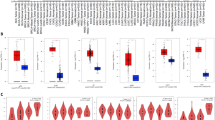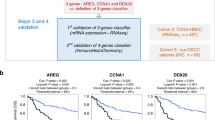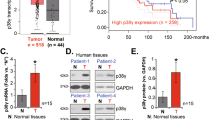Abstract
Data mining in the public domain demonstrates that cyclin-dependent kinase 4 (CDK4) is highly expressed in nasopharyngeal carcinomas (NPC). Associated with cyclin-D, CDK4 phosphorylates and inactivates retinoblastoma (Rb) protein family members and mediates progression through the G1- to the S-phase of the cell cycle. Amplification and overexpression of CDK4 has been identified in various human malignancies. However, its expression and amplification has never been systemically evaluated in NPC. This study aimed to evaluate the amplification and expression status, correlation with clinicopathological features, and prognostic implications of CDK4 based on public domain dataset and in our well-defined cohort of NPC patients. The association between CDK4 transcript level and gene dosage was explored by analysis of an independent public domain dataset. We retrospectively assessed CDK4 immunoexpression in biopsies of 124 consecutive NPC patients devoid of initial distant metastasis and treated according to consistent guidelines. The results were correlated with clinicopathological features, local recurrence-free survival (LRFS), distant metastasis-free survival (DMeFS), and disease-specific survival (DSS). High levels of CDK4 protein were positively correlated with the T 3, 4 status (p = 0.024); N 2, 3 status (p < 0.001); and the American Joint Committee on Cancer stage 3, 4 (p < 0.001). Multivariate analysis suggested high CDK4 expression was an independent prognostic indicator of worse DMeFS (p = 0.001, hazard ratio (HR) = 3.226) and DSS (p = 0.037, HR = 1.838). Although CDK4 is frequently upregulated, its gene locus is very uncommonly amplified in NPC. CDK4 overexpression is mostly independent with gene amplification and represents a potential prognostic biomarker in NPC and may indicate tumor aggressiveness through cell cycle dysregulation.




Similar content being viewed by others
Abbreviations
- NPC:
-
Nasopharyngeal carcinoma
- EBV:
-
Epstein-Barr virus
- WHO:
-
World Health Organization
- CDK4:
-
Cyclin-dependent kinase 4
- Rb:
-
Retinoblastoma
- LRFS:
-
Local recurrence-free survival
- DMeFS:
-
Distant metastasis-free survival
- DSS:
-
Disease-specific survival
- RT:
-
Radiotherapy
References
Ng WT, Lee MC, Hung WM, et al. Clinical outcomes and patterns of failure after intensity-modulated radiotherapy for nasopharyngeal carcinoma. Int J Radiat Oncol Biol Phys. 2011;79:420–8.
Lee AW, Sze WM, Au JS, et al. Treatment results for nasopharyngeal carcinoma in the modern era: the Hong Kong experience. Int J Radiat Oncol Biol Phys. 2005;61:1107–16.
Leung TW, Tung SY, Sze WK, et al. Treatment results of 1070 patients with nasopharyngeal carcinoma: an analysis of survival and failure patterns. Head Neck. 2005;27:555–65.
Burkhart DL, Sage J. Cellular mechanisms of tumour suppression by the retinoblastoma gene. Nat Rev Cancer. 2008;8:671–82.
Benson C, Kaye S, Workman P, Garrett M, Walton M, de Bono J. Clinical anticancer drug development: targeting the cyclin-dependent kinases. Brit J Cancer. 2005;92:7–12.
Kao YC, Lee SW, Lin LC, et al. Fatty acid synthase overexpression confers an independent prognosticator and associates with radiation resistance in nasopharyngeal carcinoma. Tumour Biol. 2013;34(2):759–68.
Win KT, Lee SW, Huang HY, et al. Nicotinamide N-methyltransferase overexpression is associated with Akt phosphorylation and indicates worse prognosis in patients with nasopharyngeal carcinoma. Tumour Biol. 2013;34(6):3923–31.
Lan J, Tai HC, Lee SW, Chen TJ, Huang HY, Li CF. Deficiency in expression and epigenetic DNA Methylation of ASS1 gene in nasopharyngeal carcinoma: negative prognostic impact and therapeutic relevance. Tumour Biol. 2014;35(1):161–9.
Lan J, Huang HY, Lee SW, et al. TOP2A overexpression as a poor prognostic factor in patients with nasopharyngeal carcinoma. Tumour Biol. 2014;35(1):179–87.
Ma LJ, Lee SW, Lin LC, et al. Fibronectin overexpression is associated with latent membrane protein 1 expression and has independent prognostic value for nasopharyngeal carcinoma. Tumour Biol. 2014;35(2):1703–12.
Hsu HP, Li CF, Lee SW, et al. Overexpression of stathmin 1 confers an independent prognostic indicator in nasopharyngeal carcinoma. Tumour Biol. 2013 Nov 12. [Epub ahead of print]
Budwit-Novotny DA, McCarty KS, Cox EB, et al. Immunohistochemical analyses of estrogen receptor in endometrial adenocarcinoma using a monoclonal antibody. Cancer Res. 1986;46:5419–25.
McClelland RA, Finlay P, Walker KJ, et al. Automated quantitation of immunocytochemically localized estrogen receptors in human breast cancer. Cancer Res. 1990;50:3545–50.
Masai H, Arai K. Cdc7 kinase complex: a key regulator in the initiation of DNA replication. J Cellular Physiol. 2002;190:287–96.
Gstaiger M, Jordan R, Lim M, et al. Skp2 is oncogenic and overexpressed in human cancers. Proc Natl Acad Sci U S A. 2001;98:5043–8.
Sutterluty H, Chatelain E, Marti A, et al. p45SKP2 promotes p27Kip1 degradation and induces S phase in quiescent cells. Nat Cell Biol. 1999;1:207–14.
Seder CW, Hartojo W, Lin L, et al. Upregulated INHBA expression may promote cell proliferation and is associated with poor survival in lung adenocarcinoma. Neoplasia. 2009;11:388–96.
Molven A. CDK4 (cyclin-dependent kinase 4). Atlas Genet Cytogenet Oncol Haematol. 2007;11:117–8.
Wang YL, Uhara H, Yamazaki Y, Nikaido T, Saida T. Immunohistochemical detection of CDK4 and p16INK4 proteins in cutaneous malignant melanoma. Brit J Dermatol. 1996;134:269–75.
Poomsawat S, Buajeeb W, Khovidhunkit SO, Punyasingh J. Alteration in the expression of cdk4 and cdk6 proteins in oral cancer and premalignant lesions. J Oral Pathol Med: Off Publ Int Assoc Oral Pathol Am Acad Oral Pathol. 2010;39:793–9.
Al-Aynati MM, Radulovich N, Ho J, Tsao MS. Overexpression of G1-S cyclins and cyclin-dependent kinases during multistage human pancreatic duct cell carcinogenesis. Clin Cancer Res: Off J Am Assoc Cancer Res. 2004;10:6598–605.
Tang LH, Contractor T, Clausen R, et al. Attenuation of the retinoblastoma pathway in pancreatic neuroendocrine tumors due to increased cdk4/cdk6. Clin Cancer Res: Off J Am Assoc Cancer Res. 2012;18:4612–20.
An HX, Beckmann MW, Reifenberger G, Bender HG, Niederacher D. Gene amplification and overexpression of CDK4 in sporadic breast carcinomas is associated with high tumor cell proliferation. Am J Pathol. 1999;154:113–8.
Rollbrocker B, Waha A, Louis DN, Wiestler OD, von Deimling A. Amplification of the cyclin-dependent kinase 4 (CDK4) gene is associated with high cdk4 protein levels in glioblastoma multiforme. Acta Neuropathol. 1996;92:70–4.
Ghazizadeh M, Jin E, Shimizu H, et al. Role of cdk4, p16INK4, and Rb expression in the prognosis of bronchioloalveolar carcinomas. Respir Int Rev Thor Dis. 2005;72:68–73.
Wu A, Wu B, Guo J, et al. Elevated expression of CDK4 in lung cancer. J Transl Med. 2011;9:38.
Gast A, Scherer D, Chen B, et al. Somatic alterations in the melanoma genome: a high-resolution array-based comparative genomic hybridization study. Gene Chromosome Cancer. 2010;49:733–45.
Muthusamy V, Hobbs C, Nogueira C, et al. Amplification of CDK4 and MDM2 in malignant melanoma. Gene Chromosome Cancer. 2006;45:447–54.
Pilotti S, Della Torre G, Mezzelani A, et al. The expression of MDM2/CDK4 gene product in the differential diagnosis of well differentiated liposarcoma and large deep-seated lipoma. Brit J Cancer. 2000;82:1271–5.
Wikman H, Nymark P, Vayrynen A, et al. CDK4 is a probable target gene in a novel amplicon at 12q13.3-q14.1 in lung cancer. Gene Chromosome Cancer. 2005;42:193–9.
Yu J, Deshmukh H, Payton JE, et al. Array-based comparative genomic hybridization identifies CDK4 and FOXM1 alterations as independent predictors of survival in malignant peripheral nerve sheath tumor. Clin Cancer Res: Off J Am Assoc Cancer Res. 2011;17:1924–34.
Shimura T, Kakuda S, Ochiai Y, et al. Acquired radioresistance of human tumor cells by DNA-PK/AKT/GSK3beta-mediated cyclin D1 overexpression. Oncogene. 2010;29:4826–37.
Shimura T, Kakuda S, Ochiai Y, Kuwahara Y, Takai Y, Fukumoto M. Targeting the AKT/GSK3beta/cyclin D1/Cdk4 survival signaling pathway for eradication of tumor radioresistance acquired by fractionated radiotherapy. Int J Radiat Oncol Biol Phys. 2011;80:540–8.
Hagen KR, Zeng X, Lee MY, et al. Silencing CDK4 radiosensitizes breast cancer cells by promoting apoptosis. Cell Div. 2013;8:10.
de Carcer G, Perez de Castro I, Malumbres M. Targeting cell cycle kinases for cancer therapy. Curr Med Chem. 2007;14:969–85.
Fry DW, Harvey PJ, Keller PR, et al. Specific inhibition of cyclin-dependent kinase 4/6 by PD 0332991 and associated antitumor activity in human tumor xenografts. Mol Cancer Ther. 2004;3:1427–38.
Acknowledgements
This study is supported by Chi Mei Medical Center (CMFHR10303) and the Ministry of Health and Welfare (MOHW103-TD-B-111-05).
Conflicts of interest
None
Author information
Authors and Affiliations
Corresponding author
Electronic supplementary material
Below is the link to the electronic supplementary material.
Supplementary Table 1
(DOC 51 kb)
Rights and permissions
About this article
Cite this article
Chen, TJ., Lee, SW., Lin, LC. et al. Cyclin-dependent kinase 4 overexpression is mostly independent of gene amplification and constitutes an independent prognosticator for nasopharyngeal carcinoma. Tumor Biol. 35, 7209–7216 (2014). https://doi.org/10.1007/s13277-014-1884-2
Received:
Accepted:
Published:
Issue Date:
DOI: https://doi.org/10.1007/s13277-014-1884-2




